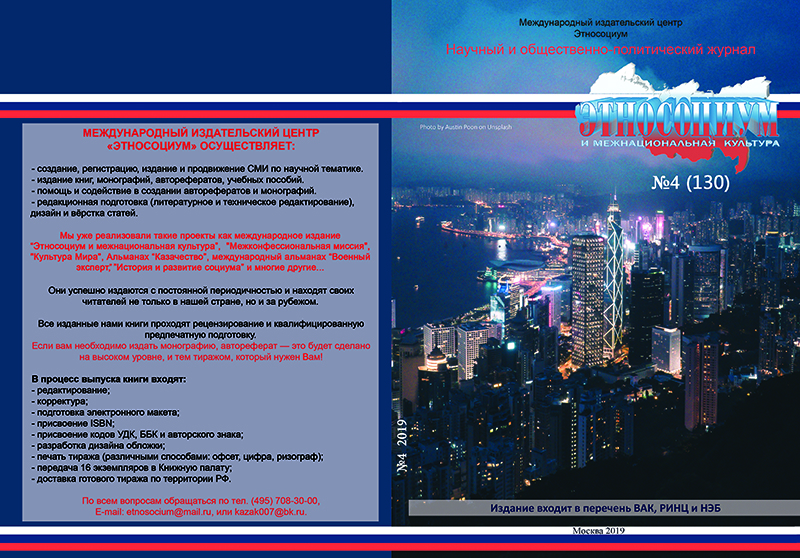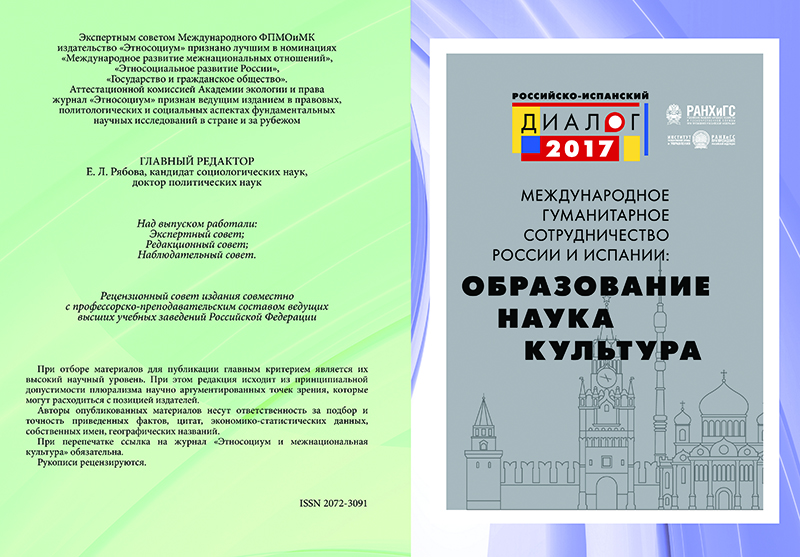

Content
|
COUNCIL OF INTERNATIONAL RELATIONSHIP
|
|
|
Belousov urged to speed up the adoption of bills on the digital economy
|
9
|
|
Kachurovskiy D.I. Theory and practice of digital democracy in public administration
|
11
|
|
Shamarov P.V. National Security: the content of the concept
|
16
|
|
CONTEST
|
|
|
Denega T.A. The development of digital technologies in the activities of state bodies
|
26
|
|
Malkina A.I. Digital technology in public administration
|
45
|
|
Rudenko A.Yu. Information support of state cadastral registration in Russia
|
51
|
|
REGIONAL STUDY:
POLITICS, ECONOMICS, LAW
|
|
|
Ponomarenko B.T., Dergachev S.V. Improving the legal mechanism of the municipal personnel policy at the stage of development of local self-government
|
64
|
|
INTERNATIONAL RELATIONSHIPS:
POLITICS, ECONOMICS, LAW
|
|
|
Cao Jing Main stages of China's ocean policy's development in the end of 20th ~ beginning 21st century
|
75
|
|
Andres Alejandro Villa Gutierrez Columbo-Venezuelan. Border Hotline
|
86
|
|
Biryukov S.V. Merkel, Von Leyen and the unity of Europe: the quality and strategic choice of modern European elites
|
100
|
|
CONFERENCE
|
|
|
Bagaeva A.V. Social stratification is the key to understanding regional integration potential
|
107
|
|
Peycheva A.A. Propaganda and fake news
|
116
|
|
Van Khayan' Eurasian Economic Union, Silk Road Economic Belt and Central Asia Integration
|
121
|
|
Qiu Xiaofen Changes in China's Foreign Policy in the 21st Century
|
127
|
|
Kim F.S. Imposing to tolerance and syndrome of "good country"
|
132
|
|
Abstracts
|
136
|
|
Authors
|
145
|
|
Requirements to materials submitted to the international publishing house "Etnosocium"
|
149
|
The article considers and analyzes the General mechanism of implementation of digital democracy. Attention is focused on the need to follow a clear methodology in the implementation of information and communication technologies for management decision-making. It is concluded that it is necessary to introduce social design tools in the implementation of digital democracy mechanisms in order to control and develop balanced and optimal solutions.
Keywords: digital democracy, E-democracy, e-democracy, e-governance, information management, information society, information and communication technologies in governance.
The article explores the process of theoretical substantiation, development of political content, normative consolidation of the concept of “national security” and the ambiguity of the scientific interpretation of such a definition, argues the need to formulate its general scientific definition, the theoretical and applied aspects of which can influence the development of theoretical foundations of state security.
An author’s definition of national security is proposed, substantive integration in the content of the current national security concept of the Russian Federation of liberal-democratic and public-state approaches is substantiated, the exceptional importance of ensuring the national security of the country, which currently serves as a prerequisite for preserving Russian state sovereignty, is shown separation in the specified quality in the relevant state opolagayuschih documents.
The difficulties in understanding the essence of the national security of Russia and its support system are explained, which are linked to the varying degrees of research of its subsystem elements, their incomplete isolation and disclosure, for example, international peacekeeping.
Keywords: state, national security, national interests, national security system, international peacekeeping activities.
An important issue for Russia in the context of a shrinking resource base and the search for growth drivers for the economy is becoming the state’s leadership in the digital environment: digitalization of public administration and automation of decisions that entail reducing costs for administrative staff and increasing the efficiency of decisions made. This article addresses the issue of the impact of digital technologies on increasing the efficiency of public administration.
Keywords: digitalization, public administration, digital technologies, platform, electronic document management system (EDMS), Unified Portal of State and Municipal Services (EPGU), Unified Identification and Authentication System (ESIA), interdepartmental electronic interaction system (SMEV), digital transformation.
This article provides an analysis of theoretical approaches to public administration in the development of the digital economy in Russia. The concepts and essence of public administration in the new socio-economic conditions of Russia's development are considered, as well as the priority directions for introducing digital technologies into the public administration system.
Keywords: digital technologies, digitalization, digital economy, smart control, digital culture.
The article is devoted to the information component of the state cadastral registration in the Russian Federation. The objectives and functions of the state cadastral registration, as well as the collection, storage, analysis and updating of cadastral information are considered. Particular attention is paid to the unified information system of state property management, in which cadastral registration is considered as a system of information relations.
Keywords: state cadastral registration, state registration of real estate, cadastre, real estate.
The article presents the results of the analysis of the legal mechanism of the municipal personnel policy, ensuring the socio-economic development of municipalities. Based on scientific ideas about the municipal personnel policy, the need to clarify the substantive parameters of the development of local government and the choice of forms of their implementation in the system of municipal government is justified.
Keywords: personnel policy, subject of personnel policy, municipality, municipality, municipal personnel policy, personnel strategy, legal mechanism of regulation.
This article overviews the main stages of China's ocean development strategy formation to discuss the main stages of the process through which the ocean dimension of the Chinese economic policy developed into one of the main directions of the Chinese geopolitical and economic development through the prism of the State Oceanic Administration (SOA). The article mainly draws from the Chinese governmental and scientific publications. The article highlights the main stages in the evolution of China's contemporary ocean policy. The analysis of the official documents gives the conclusion that the dedicated governemntal institutions were the main actor in all stages of the China's ocean policy formation process. These institutions evolved over time and as their importance grew, so did the centralisation of control over them from the party organs, and, eventually, the SOA was transformed into a ministry in 2018.
Keywords: China's ocean policy, China's economy, State Oceanic Administration, sea territory, China, Communist Party of China.
Economic and politic crisis in Venezuela has led to the greatest South American “Exodus” in XXI century, and clearly, has affected the dynamics in the Colombia-Venezuela border land, especially after 2014 due to oil barrel Price decrease, caused by the high dependence from called “Black Oil” in the national incomes. The main affected country by this massive immigrational movement is Colombia, which not only shares with most of its land borders (2.219 km), but also shares a colonial and republican past from more than 400 years ago. At final, Nicolás Maduro is a leader who will not leave the power so easy and without caring the suffering of his people, he is decided to face the last consequences of this, including a possible intern or extern armed conflict for Miraflores Palace.
Keywords: Venezuela, Colombia, crisis, politics, economy, oil, borders, migration.
The issue of the future of "United Europe" is on the agenda of world politics today. The author of the article links the consideration of this problem with the problem of the quality of the elite. The analysis of the process of "elite circulation" in the leading countries of the European Union leads the author to the conclusion about the uncertainty of the future of this political union, which is associated with certain political risks.
Keywords: Europe, European Union, NATO, Germany, political elite, establishment, political responsibility.
The process of regional integration initially focused on its economic benefits. However, it turned out that without taking into account many factors that do not lie on the surface, the economic preferences of the unification of the states of a particular region stop working. These unaccounted factors include regional stratification. This article is devoted to its features and risks associated with it.
Keywords: region, integration, stratification, federalism, separatism, picture of the world.
Bombed by ads and unknown images, our modern world is full of secrets and even threats around every corner. From our youth we turn to the Internet for information and searching for answers, barely aware of the types of propaganda and "fake news" that threaten our sovereignty as a citizen, our nation and organizations to which we belong. Of course, these are the so-called "problems of the developed world", but after we saw the actions and the lack of a policy regarding the protection of national sovereignty and individual sovereignty regarding publications in the Internet media, these countries do not seem to be so "developed" in the end.
Keywords: sovereignty, media, propaganda, "fake news", Russia, Philippines, McDonalds, state terrorism, EU.
The speech raises the question of possible value benchmarks when conducting foreign policy in the face of increasing political and geological and climatic instability. It is argued that the problem of boundaries of tolerance must be considered in the context of international relations.
Keywords: boundaries of tolerance, conservatism, cultural identity.